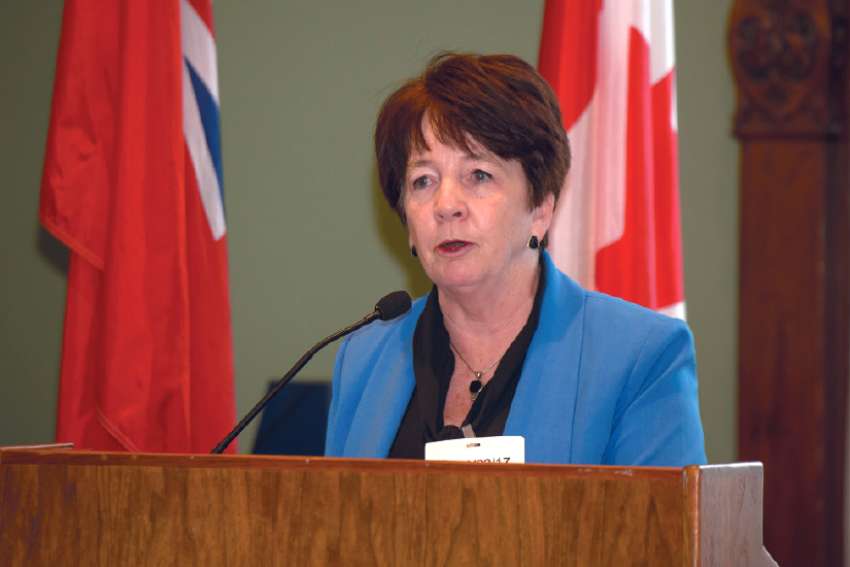“Potentially, sure, we could be going to Catholic Charities and saying, ‘hey, our rent collections dropped 10 or 15 per cent,’ ” Robin Griller, executive director of St. Michael’s Homes, told The Catholic Register.
St. Michael’s Homes/Matt Talbot Houses runs recovery and transitional housing programs for alcoholics and addicts, most of whom also struggle with mental illness and long-term emotional trauma. The Catholic agency gets about 25 per cent of its funding from ShareLife via Catholic Charities and about 30 per cent in rent deducted from the monthly cheques clients receive either from the Ontario Disability Support Program (ODSP) or Ontario Works (OW).
At present, most St. Michael’s Homes clients qualify for ODSP, which grants a maximum of $1,169 per month. The province announced social assistance reforms in November — expected to be rolled out over the next 18 months — that includes narrowing the definition of disability. If clients get shunted off ODSP and onto OW, their monthly income drops to $733 and the rent they can pay drops along with their income. It could mean a big hit on the Catholic agency’s budget, with nobody but donors in Catholic parishes available to make up the difference.
St. Michael’s Homes is unlikely to be the only Church agency hit hard.
Under the last Liberal budget in the spring, a single person receiving traditional welfare, or OW, could combine enough work earnings and welfare to drag themselves up over the Statistics Canada low-income measure poverty line of $22,657 per year before they would lose their benefits. Under the proposed Conservative changes, people who combine work and OW income will lose all their benefits — including drug and dental coverage — when they are still $6,000 below the poverty line.
For the disabled, getting a job will mean they lose their benefits when they are still $4,000 below the poverty line under the Conservative reforms. Losing drug and dental benefits is a big issue for St. Michael’s Homes clients, said Griller.
“The issue is that they have significant medication costs,” he said. “They can’t work if they’re then going to have to spend a huge proportion of their income paying for mental health meds.”
The Interfaith Social Assistance Reform Coalition is worried about longer lines at church food banks and more homeless people relying on shelters because they can’t pay rent, said ISARC chair Rev. Susan Eagle.
“While the Ford government is bragging that they’re incentivising people to get back to work, they’re actually setting up a system that is going to be more punitive,” Eagle said.
Conservative welfare reforms would increase the limit on earned income to $300 per month before the welfare office starts clawing back a percentage of earnings. That’s $100 less than the $400 earned income allowance in the previous government’s spring 2018 budget.
But more significant than the amount someone on welfare could earn from a part-time job is the new clawback rate that kicks in once the worker on OW or ODSP brings in more than $300 per month, said Eagle.
Under the old system, the province reduced its benefit payments by 50 cents for every dollar earned above the $400 exemption that would have kicked in next year. Under the new system, the government will reduce its welfare cheques by 75 cents for every dollar above the $300 exemption.
“A 75 per cent clawback is a pretty high tax on anything you earn, right?” said Eagle.
St. Michael’s Hospital poverty and welfare expert Dr. Gary Bloch worries the Conservative proposals rely on algorithms and computers to make decisions on who should or should not be receiving benefits.
“There’s no question that those people who are the most vulnerable from a mental health standpoint could have the most difficult time dealing with a system that is less personal in the way it enforces rules,” he told The Catholic Register.
While Bloch, who wrote a 2017 report on ways to make the welfare system more effective, applauds the Conservatives for recognizing the buildup of too many regulations and procedures, he warns there are no simple solutions.
“We’re looking at a system that doesn’t work already,” he said. “The question is, are we choosing to make it worse or better? There’s no question this could go in the wrong direction.”


